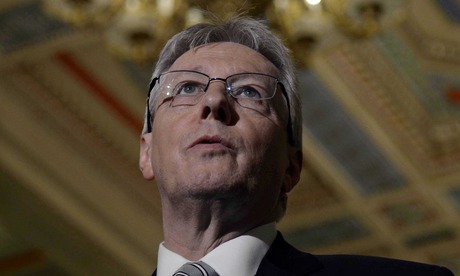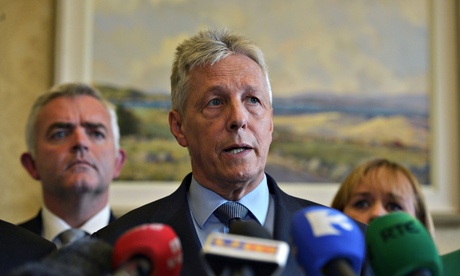The government is open to reviving an international ceasefire monitoring group to investigate and deter future paramilitary activity in Northern Ireland, it has been announced.
The Northern Ireland secretary, Theresa Villiers, told the House of Commons on Tuesday that she was giving serious consideration to resurrecting the Independent Monitoring Commission (IMC) as one step in restoring unionist confidence in the region’s power-sharing political settlement.
One unionist party has already resigned from the devolved government while the larger pro-union force, the Democratic Unionists, effectively have one foot out of the power-sharing coalition over allegations that the IRA still exists and is killing enemies within its own community.
A key demand of unionists to rebuild trust with republicans is that a new version of the IMC is put in place to examine allegations of ceasefire breaches and recommend political sanctions if there is proof of ongoing paramilitary activities.
The IMC was created in the late 1990s not only to monitor IRA and loyalist organisations but also to act as a political deterrent against any return to violence.
It was wound up after the Provisional IRA leadership announced in 2005 that it was disbanding as a military movement and later disarmed most of its huge illegal arsenal. The monitoring group was comprised of former security officials from the Metropolitan police, the CIA and the Garda Síochána.
In her speech to MPs Villiers admitted that the political situation in Northern Ireland was “very grave” as relations between unionists and republicans had “almost completely broken down”.
The minister said: “The brutal murders of Gerard Davison and Kevin McGuigan have brought into sharp focus the continuing problems around the existence of paramilitary organisations in Northern Ireland and the involvement of some of their members in criminality and organised crime.
She added: “Serious consideration needs to be given to whether the time is right to re-establish a body along the lines of the Independent Monitoring Commission.”
Villiers stressed that no one wanted to turn the clock back and return Northern Ireland to the days of direct rule from London.
At present, the Northern Ireland executive exists in a kind of political limbo after Peter Robinson stepped down as the first minister last week. All but one of his Democratic Unionist party (DUP) ministers in the power-sharing coalition have resigned, but to keep the executive in shadow existence, Robinson has appointed Arlene Foster as the acting first minister. She remains the finance minister.
Sinn Féin has consistently denied that the IRA was involved in killing Kevin McGuigan, who was targeted in August because republicans in Belfast believe he was the gunman behind the murder of his one-time IRA comrade Gerard “Jock” Davison in May. Party spokespeople have described those behind both revenge killings as “criminals and dissidents”.
The republican party has also warned about the dangers of imposing preconditions on the talks and accused the unionist parties of manufacturing the crisis that threatens to topple power-sharing government because of election rivalry.
The Northern Ireland secretary’s speech appeared to have delayed the start of full plenary talks between all of the five main parties and the British and Irish governments to much later this week.
Responding to her Commons speech, the DUP leader, Peter Robinson, described her words as a “a holding statement” and that his party would wait for concrete commitments from the government before they go into plenary negotiations with the other parties.
The movement came as the newly appointed shadow secretary of state for Northern Ireland, Vernon Coaker, insisted that Labour policy on Northern Ireland would remain “absolutely the same” despite the party’s new leader supporting a united Ireland.
Coaker made the comments following Villiers’ statement in which she also asked Coaker to clarify his party’s position since Jeremy Corbyn was elected leader on Saturday.
“The new Labour leader and the shadow chancellor are on record many times as expressing their support for a united Ireland,” Villiers told MPs. “That is an entirely legitimate view, as is the clearly held preference of these Conservative benches that our country stays together and that Northern Ireland remains part of the United Kingdom.
“But it would be helpful for the shadow secretary of state to confirm, when he responds today, that under his party’s new leadership the consent principle at the heart of the Belfast agreement will remain paramount.”
Principle of consent is one of the key points of the Good Friday agreement (Belfast agreement). It states that both the aspiration to a united Ireland and the wish for Northern Ireland to remain part of the United Kingdom are legitimate views.
Coaker said: “Can I say straight away to the secretary of state that it’s the intention of this side of the house, as well as my own intention, to pursue a bi-partisan approach based on the agreements reached, in particular the principle of consent. .
“Our policy remains absolutely the same and I would emphasise that to the secretary of state and to all of those who may be listening and reading this debate.”
Speaking to the BBC in July, Corbyn was asked about his support for a united Ireland. “I do believe ultimately that Ireland should be reunited, but I also never believed there was going to be a military victory for either side in Northern Ireland,” he said.
“There had to be a peace process and there was a peace process and I am not ashamed of those of us that had the courage to step outside and say there has to be discussions with people ... in order to bring about a ceasefire.”
John McDonnell, the new shadow chancellor, told a gathering to commemorate the IRA hunger striker Bobby Sands in 2003 that it was “about time we started honouring those people involved in the armed struggle”.
“It was the bombs and bullets and sacrifice made by the likes of Bobby Sands that brought Britain to the negotiating table. The peace we have now is due to the action of the IRA.”
Later defending his comments in the Guardian, McDonnell wrote: “Let me be clear, I abhor the killing of innocent human beings. My argument was that republicans had the right to honour those who had brought about this process of negotiation which had led to peace. Having achieved this central objective now it was time to move on.”












